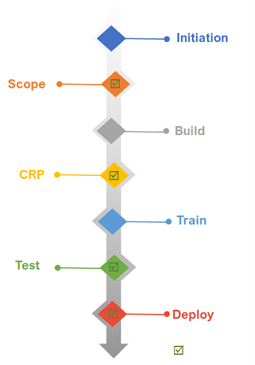

Over the past 17 years, VistaVu Solutions has sold and implemented Enterprise Resource Planning (ERP) systems for companies in a wide range of industries across North America.
In my experience, many companies considering an ERP purchase tend to focus heavily on the system’s features and functions. A powerful feature set makes a big impression, so the attraction is understandable. To ensure that you get the right system, you will want to conduct requirements gathering with each department or business unit so you can clearly articulate your needs to the vendor. This will give you the highest chance of success in finding the right solution.
If you are considering an ERP purchase, here is my top advice — I encourage you to think of features and functions as only one leg of a three-legged stool. You need all three in place for your ERP to deliver the benefits you want.
The other two legs require answers to the following questions to ensure you have the most well-rounded understanding of your future solution.
In saying this, I don’t mean which company, brand or logo. I mean the individuals who will be implementing your ERP.
Prospective buyers should ask for names, resumés and references of the people doing the work of your ERP implementation. Scrutinize these carefully.
Your implementer should have many years of experience with the same ERP system that you’re buying and they should have worked with many companies that look like yours. Ideally, they would come from the industry, so they have sat on your side of the table before. This industry experience will allow them to appreciate software in practical application. And they will be able to better communicate and empathize with you.
It’s a good idea to ask for references and to contact two or three of their most recent implementations. You will want to see their certification in implementing that system (all ERP publishers have a certification process for their partners). You want to know that your implementer not only has a solid track record over time, but is recognized as one of the top professional organizations at this moments in time.
If the person’s ERP resumé seems thin, or references are not provided, that should be a red flag for your purchase.
We’ve dealt with the what (the features and functions of the ERP system you’re buying). We’ve dealt with the who (the people who’ll perform the implementation).
The final leg of the stool is about how – in other words, the process.
If I were an ERP customer, I would want a detailed understanding of how the implementation will take place and what’s expected of me in the process. While your system integrator will have their own method of implementing, several activities are universal:

There are various frameworks to implement ERP, with names like Agile and Waterfall. You don’t need to know all of those details, but you do need to know that your implementer has a clear, proven methodology.
Even at the best of times, ERP implementations are complex, invasive and sometimes painful. To implement successfully, the process needs to be structured with military precision. That includes both the implementer’s work and what you’re expected to do as the customer.
If the process outlined by your implementer seems casual or chaotic, that’s how your implementation will go.
While features and functions are important, if your ERP never gets up and running – because the implementer was inexperienced or their process was poor – you’ll never get to use those cool features anyway.
If you have questions about what ERP can do for your organization, please don’t hesitate to reach out.




VistaVu creates solutions for your business.
Offices in Calgary, Houston, Dallas, Denver, & New York.
Call us at 1-888-300-2727 ext. 105

